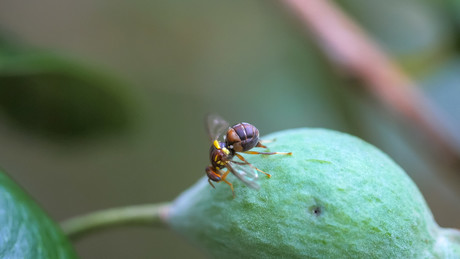Did the Queensland fruit fly found in NZ have any friends?

On St Valentine’s Day a single male Queensland fruit fly was found in a surveillance trap in the Auckland suburb of Devonport, sparking a flurry of activity.
New Zealand is free from Queensland fruit flies but if they move in there could be serious consequences for New Zealand’s horticultural industry. The fruit flies can damage a wide range of fruit and vegetables and could lead to restrictions on trade in some of NZ’s horticultural exports.
80% of NZ’s horticulture crops are susceptible to attack by Queensland fruit fly and the pest could jeopardise a horticulture industry worth $5 billion a year in domestic sales and exports.
This is not the first time a Queensland fruit fly has been trapped in NZ. In five of the other six incidents it was a solitary fly and all was okay. But in one instance the trapped fly was part of a wider population and this led to an intense and successful eradication program.
The most likely way that fruit flies can arrive in New Zealand is in fresh fruit and vegetables. Biosecurity New Zealand has strict requirements on the importation of fruit and vegetables to minimise this risk. Air and sea passengers are prohibited from bringing fresh fruit and vegetables into the country.
NZ’s Ministry for Primary Industries is always on the alert for unwanted pests. It has employed a lure-based surveillance trapping network involving some 7500 traps set nationwide since the 1970s. By setting traps for pest insects, Biosecurity NZ is able to find them early, have assurance about exactly where the problem is located and respond faster and more effectively where finds are made.
After the Queensland fruit fly was found in the trap in Devonport the MPI has been:
- extending the network of traps
- inspecting home gardens in the area for plants that could provide suitable habitat for fruit flies
- taking fruit and vegetable samples for testing
- providing information to local residents and visitors
- signposting key arterial roads and at the Devonport Ferry Terminal
- providing bins in the Controlled Area for local people to safely dispose of fruit and vegetable waste.
The legal Controlled Area in Devonport restricts the movement of certain fruit and vegetables from the area. More than 60 people are working in Auckland plus another 20 Biosecurity New Zealand staff are working from national headquarters in Wellington.
Biosecurity New Zealand’s bio-secure mobile field laboratory has been set up at the Devonport Naval Base, where staff there are inspecting produce collected from the area for signs of fruit fly and larvae.
More information is available at www.biosecurity.govt.nz/fruitfly.
Eggless muffins using clean-label texturiser
Bakery solutions specialist Lasenor Emul, S.L. has crafted muffins with 50–100% less egg...
DNA base editing could enable better probiotic strains
Thanks to DNA base editing technology, researchers have created a strain of...
Tree sap: a plant-based gelatine alternative?
Researchers from the University of Ottawa may have found a new plant-based alternative to...











